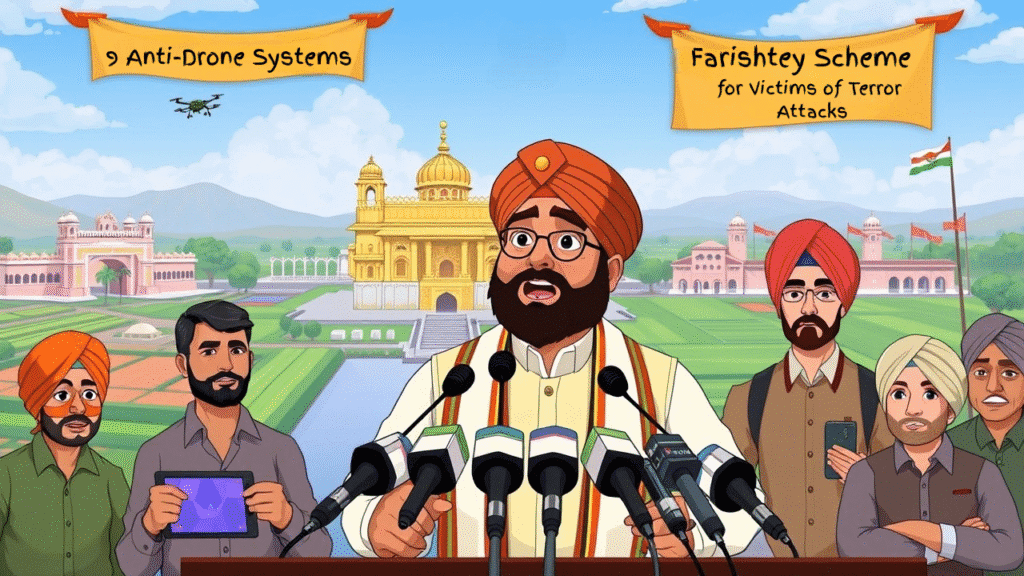
In a significant move to enhance border security and counter growing threats from across the international boundary, the Punjab Cabinet on Friday approved the procurement of nine anti-drone systems. The decision comes amid rising concerns over the use of unmanned aerial vehicles (UAVs), or drones, by anti-national elements for smuggling weapons and narcotics into India from Pakistan.
The proposal was greenlit during a high-level meeting chaired by Chief Minister Bhagwant Singh Mann. These advanced anti-drone systems will be deployed along the 532-kilometer stretch of the International Border (IB) from Pathankot in the north to Fazilka in the south. This includes districts like Gurdaspur, Amritsar, Tarn Taran, and Firozpur, which are particularly vulnerable due to their proximity to the border.
Table of Contents
Why Are Anti-Drone Systems Needed?
Over the past few years, there has been a noticeable increase in drone activity along the Indo-Pak border. Drones have been used to drop illegal items such as drugs, arms, and ammunition into Indian territory. These unmanned aircraft can fly at low altitudes and are difficult to detect using traditional radar systems, making them a serious threat to national security.
The deployment of anti-drone systems is aimed at detecting, tracking, and neutralizing these UAVs before they can reach their intended targets. These systems use a combination of technologies, including radar, radio frequency detection, and jamming devices, to identify and disable hostile drones. By investing in this technology, Punjab aims to strengthen its first line of defense against cross-border infiltration and smuggling.
The total cost of acquiring these systems is estimated at Rs 51.41 crore. While this may seem like a large sum, it is a necessary investment to protect the lives and safety of citizens living in border areas and to prevent the flow of contraband that fuels crime and terrorism within the country.
For the latest current affairs and articles covering national, international, and trending topics, please click here.
Chief Minister’s Statement
Speaking after the Cabinet meeting, Chief Minister Bhagwant Singh Mann emphasized the importance of securing the state’s borders and ensuring public safety. “These anti-drone systems will help us counter the threat posed by drones coming from across the border, including those carrying drugs and weapons,” he said.
He further stated that Punjab stands tall and firm in protecting both the country and its water resources. The Chief Minister made these remarks in response to recent tensions between India and Pakistan, as well as ongoing disputes regarding water sharing with neighboring states like Haryana.
Mann also addressed rumors about shortages of essential commodities. He assured the public that there was no scarcity of retail fuel or LPG (liquefied petroleum gas) in the state. At the same time, he issued a stern warning to hoarders, urging them not to create panic among people.
“We are in regular touch with our Deputy Commissioners in six border districts—Pathankot, Gurdaspur, Amritsar, Tarn Taran, Firozpur, and Fazilka,” the CM added, highlighting the government’s proactive approach in managing any potential crisis.
To explore the rich history and diverse cultural heritage of Punjab (History & Culture), please click here.
Rising Border Tensions Between India and Pakistan
The decision to bolster border defenses comes at a time when tensions between India and Pakistan have seen an uptick. Reports indicate that stray shells and debris believed to be remnants of missiles fired from across the border have landed in some parts of Punjab. However, the Chief Minister reassured the public that the situation remains under control.
Despite these incidents, life continues normally in most parts of the state. The government is closely monitoring the situation and has taken steps to ensure that civilians are not affected by any escalation along the border.
Free Medical Treatment for Victims of Terror Attacks
Another key announcement made by Chief Minister Mann during the Cabinet meeting was the extension of the Farishtey Scheme to include victims of terror attacks and war-related injuries. Under the existing scheme, free medical treatment is provided to accident victims who arrive at government hospitals without identification or financial means.
Now, individuals injured in terrorist attacks or armed conflicts will also receive similar benefits. This expansion of the scheme reflects the government’s commitment to providing support and care to all those who suffer due to violence beyond their control.
“This step is a small way of showing our solidarity with the brave people who face the brunt of such attacks,” said the CM, adding that the move would provide much-needed relief to victims and their families.
Emergency Preparedness Review
In addition to enhancing border security, the Punjab Cabinet also reviewed the state’s emergency preparedness. Ministers were briefed on the readiness of hospitals, fire stations, and other critical services in case of any unforeseen events.
A detailed assessment of food grain reserves was also conducted to ensure that there are sufficient supplies available in the event of a prolonged crisis. This review underscores the government’s efforts to maintain stability and resilience across various sectors.
Immediately following the Cabinet meeting, ten ministers were dispatched to the six border districts to oversee ground-level preparations and address any issues faced by residents. Their primary task is to ensure that local populations are not harassed by opportunistic hoarders or misinformation campaigns.
“Ministers have already left for border areas. They will make sure that people are not inconvenienced by hoarders or supply chain disruptions,” the Chief Minister confirmed.
To enhance your English vocabulary with helpful articles, word lists, and practice exercises, please click here.
Importance of Border Security

Securing the border is not just a matter of national pride—it is a vital component of maintaining peace and prosperity within the country. States like Punjab, which share a long and porous border with Pakistan, are especially vulnerable to infiltration and smuggling activities.
By deploying anti-drone systems, the state government is taking a proactive stance in preventing such threats. It also sends a strong message that India is prepared to defend itself using modern technology and strategic planning.
Moreover, ensuring the availability of essential services and commodities helps build public confidence in the government’s ability to manage crises. In times of uncertainty, clear communication and decisive action play a crucial role in keeping society stable and secure.
The Punjab Cabinet’s decision to purchase anti-drone systems marks a significant milestone in the state’s efforts to strengthen border security. With increasing instances of drone-based smuggling and cross-border terrorism, it is imperative that authorities remain vigilant and equipped with the latest tools to combat these challenges.
Chief Minister Bhagwant Singh Mann’s leadership and swift actions reflect a balanced approach—prioritizing national security while also addressing public concerns about safety, health, and basic necessities. His assurance that the state is ready to handle any situation provides much-needed comfort to the people of Punjab.
As the government continues to monitor the situation along the border and implement measures to safeguard its citizens, it is essential for everyone to remain calm and trust the institutions working tirelessly to protect the nation. The deployment of anti-drone systems is just one step in a broader strategy to ensure peace, security, and development for all.
Punjab Cabinet Ministers List (As of 2025)
| Sl. No. | Name |
|---|---|
| 1 | Sh. Bhagwant Singh Mann |
| 2 | Sh. Harpal Singh Cheema |
| 3 | Dr. Baljit Kaur |
| 4 | Sh. Harbhajan Singh |
| 5 | Dr. Vijay Singla |
| 6 | Sh. Lal Chand |
| 7 | Sh. Gurmeet Singh Meet Hayer |
| 8 | Sh. Kuldeep Singh Dhaliwal |
| 9 | Sh. Laljit Singh Bhullar |
| 10 | Sh. Bram Shankar |
| 11 | Sh. Harjot Singh Bains |
Static GK Table: Punjab – General Knowledge
| Topic | Details |
|---|---|
| Name of the State | Punjab |
| Capital | Chandigarh(shared with Haryana) |
| Chief Minister (as of 2025) | Bhagwant Singh Mann (Aam Aadmi Party) |
| Governor (as of 2025) | Gulab Chand Kataria |
| Total Length of Indo-Pak Border in Punjab | 532 km |
| Border Districts of Punjab (6 important ones) | Pathankot, Gurdaspur, Amritsar, Tarn Taran, Firozpur, Fazilka |
| Anti-Drone Systems Approved by Cabinet | 9 units |
| Cost of Procuring Anti-Drone Systems | ₹51.41 crore |
| Purpose of Anti-Drone Systems | To detect, track, and neutralize drones used for smuggling weapons/drugs from across the border |
| Scheme Extended to Terror Attack Victims | Farishtey Scheme |
| Earlier Coverage of Farishtey Scheme | Free medical treatment for accident victims |
| New Coverage under Farishtey Scheme | Free treatment for terror attack victims and war victims |
| Emergency Services Reviewed By Punjab Cabinet | Hospitals, fire stations, ration supplies |
| Action Taken After Cabinet Meeting | 10 ministers sent to border districts to monitor situation and prevent hoarding |
| Reason for Increased Security Concerns | Rising cross-border drone activity, stray shells from Pakistan side |
| Chief Minister’s Assurance | No shortage of essential commodities like fuel and LPG |
| Type of Government | State Government (Cabinet headed by CM) |
| Current Political Party in Power (Punjab) | Aam Aadmi Party (AAP) |
| State Tree of Punjab | Shisham(Dalbergia sissoo) |
| State Animal of Punjab | Blackbuck(Antilope cervicapra) |
| State Bird of Punjab | Northern Goshawk(Accipiter gentilis) |
| Punjab Reorganisation Act | Passed in1966 |
| Purpose of Reorganisation Act | To reorganise the state of Punjab based on linguistic lines |
| Result of the Act | Creation of three states:Punjab,Haryana, andHimachal Pradesh |
| Language Consideration | The act was passed to address demands for a Punjabi Suba (Punjabi-speaking state) |
| Date of Implementation | 1 November 1966 |
| Former Chief Minister during Reorganisation | Gurnam Singh (Sant Fateh Singh played a major role in the movement) |



















